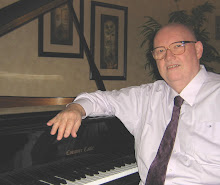
"I don't give concerts, I put on a show! I play classical music, with the boring parts left out. I'm a one man Disneyland." So said Wladziu Valentino Liberace known to his family as Walter, his friends as Lee, and his fans as Liberace. I had many encounters with Liberace in my career as a piano technician, and, at sales conventions for Baldwin pianos, and, Thomas organs, two instruments he endorsed. My mother was a huge fan, and, for her 65th birthday, Lee was kind enough to give us front row seats for his show, and, also grant my mom a dressing room "audience" afterwards. This was typical of his graciousness. Lee especially loved children, animals, and fans. Unlike other single name mega-stars, Lee typically did not disappear backstage at the end of a show. Rather, he invited fans on stage to touch his costumes and jewelry, take photos, and try their hand at playing his piano. If a person showed any musical promise, Lee would often throw in an impromptu lesson. Someone once correctly wrote that Liberace loved his audience, and they returned that love a hundred fold. That love translated into him being the highest paid entertainer in the world for over two decades!
Liberace was born in 1919 in a suburb of Milwaukee Wisconsin into a musical family of no notoriety. He started piano lessons at age four and early on displayed an amazing ability to memorize long complicated pieces of music. He was classically trained and in his early twenties toured the United States performing with many major symphony orchestras. While still in his teens, to help support his family during the Great Depression, he played popular music for radio dramas, theaters, cabarets, weddings, even strip tease shows. Although his father was Italian, and, only his mother was Polish, Lee considered himself Polish and became enamored with the great pianist Ignaz Paderewski who had a second job as Prime Minister Of Poland. Eventually they met and it is said Paderewski took the young Liberace under his wing, but, to what extent is not clear. By his mid-twenties Lee was referring to his performances as "pop with a bit of the classics." Around age thirty he played The White House at the behest of President Harry S Truman. By age forty it would be a command performance for Queen Elizabeth II. By the time he was thirty four Liberace was earning a million dollars a year. In less than two years more his income rose to approximately four million dollars a year! Not much money by today's standards, but, in the early 1950's it was a king's ransom allowing Lee to live like royalty. The big bump in income was due to his wildly successful television show that aired around 1953 and went on for many years. The show attracted about 30 million viewers a week and received 10,000 fan letters weekly. Liberace had been a headliner in Las Vegas since 1944 where he first appeared with his now trademark candelabrum. He also appeared in many movies. Songwriter Pat Ballard paid homage to Lee's enviable head of hair in the 1954 smash hit by The Chordettes, MISTER SANDMAN. Most people, however, remember Lee's TV show with his violinist elder brother George, and, the signature sign off, Lee singing I'LL BE SEEING YOU. Of course, given Lee's flamboyant costumes, it was one of the early shows to go color. Elton John, then six years old, recalls being fascinated with both Lee's piano ability, and, his costumes. I was also a fan of the show and only realized while viewing old clips of the show to prepare this blog, how much my own piano style had been influenced by Liberace. There are plenty of old clips of THE LIBERACE SHOW on the Internet on sites like U-Tube as well as clips of Lee on ED SULLIVAN, LUCY, JACK BENNY, KOJAK, THE MUPPET SHOW, OPRAH, AND, SATURDAY NIGHT LIVE. They are all worth checking out.
FOLLOWING ARE THE TYPICAL QUESTIONS I AM USUALLY ASKED ABOUT LIBERACE:
HOW GOOD A PIANIST WAS HE REALLY? I have discussed this issue with many top pianists, both popular and classical. Everyone agrees that his technique was almost effortless to the point that he made even difficult pieces look a lot easier to play than they actually were. A world renowned concert pianist recently told, me off the record, that he felt that Liberace could give most concert pianists a good run for their money playing the classics, and yet, turn right around and play ragtime, blues, country, rock and roll, or, almost anything else he pleased. He speculated that few pianists have mastered the instrument to that extent. Popular pianists, likewise, envy his ability with the classics. A conductor of a famous symphony orchestra once stated that Liberace did more to introduce people to classical music than anyone else he knew of. To speculate on how good he would have been if he had specialized in only one type of music is futile. If a music critic wrote anything negative about Liberace they often got a personal note from him that read something like: I read with amusement your recent review. It was so upsetting my brother George and I cried all the way to the bank. In another variation Lee would write, I would have cried all the way to the bank, but instead, I just bought it.
WHAT MAKE OF PIANO DID HE PLAY AND HOW OFTEN DID YOU TUNE IT? Liberace owned between 35 and 40 pianos at any given time. He only played Baldwin pianos in public which were his preference long before he became an official endorser for Baldwin. The only exception was when he played a one of a kind Melville-Clark marking piano used to make player piano rolls. Lee performed on player piano roll recordings for both QRS Buffalo and AMPICO. Notable among his arsenal of instruments were George Gershwin's Chickering Grand and Chopin's Pleyel. Lee's main stage piano was a mirrored Baldwin nine foot grand for which Lee had a matching mirrored tuxedo and a matching mirrored Rolls Royce. Unlike artists who walk across the stage to the piano, Lee was chauffeur driven. There are urban legends about this mirrored Baldwin being cursed, or, haunted, but, I doubt they are true. Lee's other stage piano was a similar rhinestone encrusted Baldwin concert grand. On rare occasions he used other Baldwins.
There was a white Baldwin baby grand that he used for his "drop in" visits to the GOOD MORNING AMERICA SHOW which I tuned on occasion. There was also Baldwin's flagship SD-10 touring concert grand that Lee used for one night only performances. I tuned this piano on a number of occasions for Liberace, Ferante & Teicher, Duke Ellington, and, Roger Williams if memory serves. How many times I tuned for Liberace I cannot recall. Most concert artists, have a legion of piano technicians all over the world who are called upon as needed. Often we are just hired by the concert promoter, or, work for the manufacturer, or, piano dealer who is furnishing the concert instrument. Because we both had a connection to Baldwin pianos and Thomas organs, I saw Lee more often at sales promotions and conventions.
DID LIBERACE ACTUALLY LIKE WEARING THE COSTUMES? From my observation he did and didn't. I hefted more than one and they were both heavy and hot. Very uncomfortable to wear at best. I think he enjoyed the way an audience reacted to them. I think he was also aware that they detracted from his musicianship. He wore at least two per performance, usually quipping at intermission, "Please excuse me while I go backstage and slip into something more spectacular!" The second costume always was more elaborate than the first. At times they made him perspire to the point that he actually lost weight. Staying hydrated was a must. It all started in his early days when he played with symphony orchestras and wore a white tuxedo to stand out from the black clad musicians. Soon came a white piano to match the tux. When he started in Las Vegas booking agents insisted that each appearance was to be accompanied by a yet more elaborate outfit. And so it went. Whatever burden the costumes imposed I think Lee well knew he would have been less popular, and, less wealthy without them.
DIDN'T HE SPEND MONEY LIKE IT WAS WATER? Liberace spent money on the things he enjoyed such as pianos, antiques, cars, clothing, and jewelry. Typical of his mid-western upbringing, he really didn't spend that much in proportion to what he earned. He supported some members of his family and was generous to his friends and those in need. His older brother George, besides being his violinist and musical conductor, was his business manager. Lee had many investments from a restaurant (he loved to cook) to a shopping mall, real estate, etc. The trappings of wealth were almost second nature to him. I remember an occasion backstage somewhere on a hot day. We were all drinking cold beverages from cans or paper cups. Lee was strolling about drinking from a gold chalice with jeweled accents as nonchalantly as if it were only a paper cup. Lee always struck me as the type whom, if he lost his fortune, would take at as noting more than a new phase of his life.
WAS LIBERACE A HOMOSEXUAL? People have so many fixed opinions on this question that it would be of no use to express mine. Here is what I know: His speech, mannerisms, and dress often did fit the somewhat misguided stereotype of the "flaming fag." However, he was personally and politically conservative. He was a devout Catholic. Lee considered his meeting with Pope Pius XII one of the high points of his life. Lee took two publications to court who accused him of being a homosexual in print, and,in both cases, won substantial awards via the juries. No man, or woman for that matter, has, to my knowledge, boasted about having a sexual affair with him.
Before this blog post turns into a book I'll close by saying that Liberace was a kind, gentle, generous, and, extremely talented man. A legend in his own time. He's been gone nearly a quarter of a century now........and his job is still available.










